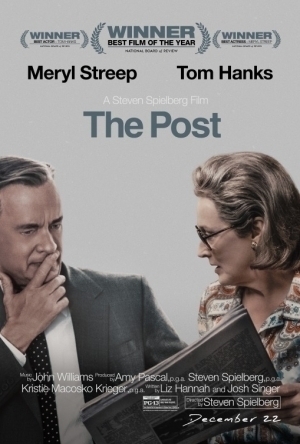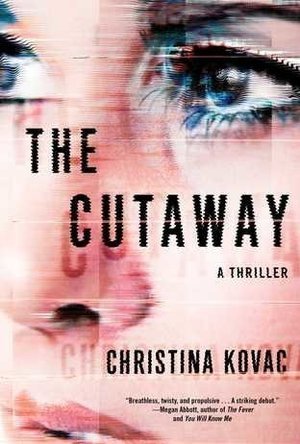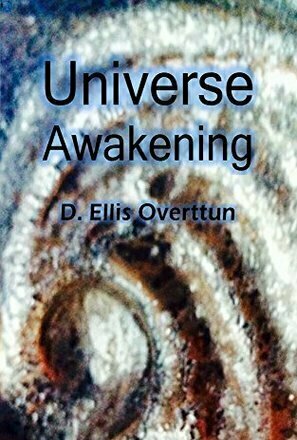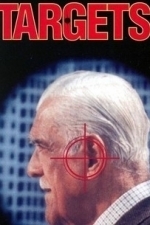Search
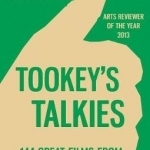
Tookey's Talkies: 144 Great Films from the Last 25 Years
Book
Christopher Tookey has seen at least 10,000 films. For eight years, he was TV and then film critic...
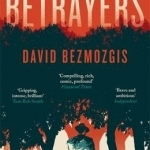
The Betrayers
Book
The Betrayers by David Bezmozgis is a searing novel about a man whose principles are tested to the...
Gareth von Kallenbach (980 KP) rated The Post (2017) in Movies
Jul 11, 2019
You can’t get on the internet these days without a political controversy smacking you right in the face. You also can’t help but notice the timing of this historical thriller directed by Steven Spielberg. Using the past’s political agenda to reaffirm the resistance we are facing today. The Post takes place in the deep thrones of the Vietnam War, the “Pentagon Papers” are leaked: a classified study of revealing a government cover up relating to the war. Kay Graham (Meryl Steep) is the owner and largest shareholder of the Washington Post newspaper. Taking on a position she never foresaw herself ever doing after the untimely death of her husband. And, finally having to make one of the toughest decision of her entire life, both personally and professionally. To not only bringing down the government, but some very close personal friends in the process. It takes her Editor-In-Chief, Ben Bradlee (Tom Hanks) to convince her the importance of the news and the role journalists must play to deliver the news and protect the governed and not the government.
When you hear the high caliber names such as Hanks, Streep, Speilberg, you can almost guarantee a top notch film with unbelievable emphasis on character development. They definitely did not disappoint! The Post works as a history lesson. Not only does it portray the events that took place with such thorough details, it exemplifies the relationship between not only a journalist and their source, but also the personal struggle between the editor, the owner of the newspaper, their friends who hold major positions within the government, and the moral obligation to at least get the truth out to the public.
The set design, the costume design, the characters’ mannerisms are flawless. Even the way social interaction was demonstrated between men and women. Women’s role is in the home, cooking, cleaning, and entertaining. Something so simple as the use of a rotary phone played such a nostalgic role. I can’t say enough about the wonderful acting skills of both Streep and Hanks. I suspect one or both with be receiving some serious accolades during awards season. Streep and Hanks both shine throughout the entire film. They both did a great job at relaying the emotions and the turmoil these characters faced.
Many lines throughout the movie–“if we don’t hold them accountable, than who will?”–ring true to a lot of the issues affecting us today.
When you hear the high caliber names such as Hanks, Streep, Speilberg, you can almost guarantee a top notch film with unbelievable emphasis on character development. They definitely did not disappoint! The Post works as a history lesson. Not only does it portray the events that took place with such thorough details, it exemplifies the relationship between not only a journalist and their source, but also the personal struggle between the editor, the owner of the newspaper, their friends who hold major positions within the government, and the moral obligation to at least get the truth out to the public.
The set design, the costume design, the characters’ mannerisms are flawless. Even the way social interaction was demonstrated between men and women. Women’s role is in the home, cooking, cleaning, and entertaining. Something so simple as the use of a rotary phone played such a nostalgic role. I can’t say enough about the wonderful acting skills of both Streep and Hanks. I suspect one or both with be receiving some serious accolades during awards season. Streep and Hanks both shine throughout the entire film. They both did a great job at relaying the emotions and the turmoil these characters faced.
Many lines throughout the movie–“if we don’t hold them accountable, than who will?”–ring true to a lot of the issues affecting us today.
Acanthea Grimscythe (300 KP) rated The Cutaway in Books
May 16, 2018
I seem to be of a minority when it comes to those that have read Christina Kovac's debut novel The Cutaway. Tagged as a mystery, suspense, and thriller novel, it really doesn't feel like one to me. While there are elements of a typical thriller, the crime at hand and the persons of interest take a back seat to the main character's love life for nearly three-fourths of the novel. In fact, the missing woman is practically non-existent for much of the story. To me, that's a pretty big turn off. I nearly dropped it, actually.
The Cutaway is supposed to focus on Virginia Knightly's efforts of getting the scoop on a missing person. En route to tracking down the perpetrator, readers encounter the typical sort of motives: affairs, money, political intrigue. It's a pretty standard plot when it comes to suspense novels. The twists are predictable and the story remains dreadfully slow until the final twenty to thirty percent.
For the most part, the characters of The Cutaway are painfully flat. Most of the male characters, with the exception of the News Director, are handsome with exceptionally whiny personalities. The News Director, Mellay, is a stereotypical angry boss sort who only cares about his own pockets. Even worse, the female characters are all Mary Sues. Sure, they have their own troubling pasts, but for as much suffering as they went through in their childhoods, the effect it has had on their adulthood is fairly minor. All of the women are drop dead gorgeous, not counting one of the witnesses. Ugh - that's all I can really say about that.
It's also clear from reading the novel that Kovac's most familiar with the reporting side of an investigation, which is to be expected from someone who has spent much of their time in the same career as the main character. Unfortunately, it also lends a bit of blandness to the story telling.
Overall, The Cutaway was an extremely painful read. Many times I considered dropping it: I could not get into the characters and I feel that the novel is more suited to the romance genre. There are several questions left unanswered and parts of it feel either rushed or as if Kovac is simply grasping at straws.
I would like to thank Atria Publishing, the author, and NetGalley for providing me with a copy for review.
The Cutaway is supposed to focus on Virginia Knightly's efforts of getting the scoop on a missing person. En route to tracking down the perpetrator, readers encounter the typical sort of motives: affairs, money, political intrigue. It's a pretty standard plot when it comes to suspense novels. The twists are predictable and the story remains dreadfully slow until the final twenty to thirty percent.
For the most part, the characters of The Cutaway are painfully flat. Most of the male characters, with the exception of the News Director, are handsome with exceptionally whiny personalities. The News Director, Mellay, is a stereotypical angry boss sort who only cares about his own pockets. Even worse, the female characters are all Mary Sues. Sure, they have their own troubling pasts, but for as much suffering as they went through in their childhoods, the effect it has had on their adulthood is fairly minor. All of the women are drop dead gorgeous, not counting one of the witnesses. Ugh - that's all I can really say about that.
It's also clear from reading the novel that Kovac's most familiar with the reporting side of an investigation, which is to be expected from someone who has spent much of their time in the same career as the main character. Unfortunately, it also lends a bit of blandness to the story telling.
Overall, The Cutaway was an extremely painful read. Many times I considered dropping it: I could not get into the characters and I feel that the novel is more suited to the romance genre. There are several questions left unanswered and parts of it feel either rushed or as if Kovac is simply grasping at straws.
I would like to thank Atria Publishing, the author, and NetGalley for providing me with a copy for review.
Phil Leader (619 KP) rated Universe: Awakening (Terra Nova #1) in Books
Nov 27, 2019
In the far future an advanced society of post-humans launch an audacious exploration project - DEUS - to probe the edges of the universe. The mission is a success but one of the two pilots involved fails to return and the other - his brother Ja'el - retreats into a self-induced coma to avoid facing up to what happened. Despite this the mission is regarded as a success and propels Science Minister Odessa to the pinnacle of political power.
Fast forward 100 years. The probes sent out by DEUS have gone dark one by one, sending potentially troubling data before they do so. Ja'el is showing signs of improvement to his counsellor Auberon. With the real danger that the perceived success of DEUS - the basis of her power - may unravel Odessa brings Auberon under her control to manage Ja'el's recovery.
The rest of the book follows Auberon's (and his assigned Guardians, Mich'ael and Gab'riel) as they realise that there may be a personal motive in Odessa's desire to see Ja'el rehabilited, and that they may be 'surplus to requirements' once he is.
Overttun aims high with this book; there are a lot of concepts around not only technology but future society and political attitudes. There is also a subplot around the more advanced ruling class and the far more numerous worker humans which is used to good effect to highlight social injustices of all kinds. On whole the premise is delivered well, although there are a few lengthy exposition passages, particularly early in the book, which do spoil the flow and are probably not actually required.
What is striking is the character development. All the main characters learn some lessons along the way, Auberon in particular discovering that far from being a meek and unassuming mid-rank civil servant is capable of far more, both mentally and physically, than he ever thought possible. His metaphorical awakening mirrors nicely Ja'el's rather more literal awakening.
As the first part of an intended series of books, this volume necessarily does a lot of work setting up the characters and situations and leaves a lot of threads hanging to be picked up later but there is closure around the main plots and character arcs within this part of the story.
Although this is going to be labelled as a science fiction novel because of the post-human, technological and space exploration aspects at its heart it is a political thriller. Given this and that it is chock full of interesting ideas it bears careful reading without any preconceived expectations. But above all this is an interesting read following a set of well-designed characters in a fully developed world.
With its length and depth this is not a light read but the writing style is straighforward and clear whilst still being fully descriptive and immersive which makes it a pleasure to pick it up and see what Auberon and associates will do next.
The characters and the world they inhabit are something the author is clearly proud of - and he is right to be. This first instalment bodes well for the rest of the series.
Fast forward 100 years. The probes sent out by DEUS have gone dark one by one, sending potentially troubling data before they do so. Ja'el is showing signs of improvement to his counsellor Auberon. With the real danger that the perceived success of DEUS - the basis of her power - may unravel Odessa brings Auberon under her control to manage Ja'el's recovery.
The rest of the book follows Auberon's (and his assigned Guardians, Mich'ael and Gab'riel) as they realise that there may be a personal motive in Odessa's desire to see Ja'el rehabilited, and that they may be 'surplus to requirements' once he is.
Overttun aims high with this book; there are a lot of concepts around not only technology but future society and political attitudes. There is also a subplot around the more advanced ruling class and the far more numerous worker humans which is used to good effect to highlight social injustices of all kinds. On whole the premise is delivered well, although there are a few lengthy exposition passages, particularly early in the book, which do spoil the flow and are probably not actually required.
What is striking is the character development. All the main characters learn some lessons along the way, Auberon in particular discovering that far from being a meek and unassuming mid-rank civil servant is capable of far more, both mentally and physically, than he ever thought possible. His metaphorical awakening mirrors nicely Ja'el's rather more literal awakening.
As the first part of an intended series of books, this volume necessarily does a lot of work setting up the characters and situations and leaves a lot of threads hanging to be picked up later but there is closure around the main plots and character arcs within this part of the story.
Although this is going to be labelled as a science fiction novel because of the post-human, technological and space exploration aspects at its heart it is a political thriller. Given this and that it is chock full of interesting ideas it bears careful reading without any preconceived expectations. But above all this is an interesting read following a set of well-designed characters in a fully developed world.
With its length and depth this is not a light read but the writing style is straighforward and clear whilst still being fully descriptive and immersive which makes it a pleasure to pick it up and see what Auberon and associates will do next.
The characters and the world they inhabit are something the author is clearly proud of - and he is right to be. This first instalment bodes well for the rest of the series.
Matthew Krueger (10051 KP) rated Targets (1968) in Movies
Jun 18, 2020
Targeting Frankenstein: A Horror Icon
Targets- is a very suspenseful film that stars a old boris Karloff. His performance in this film is different. Usually he is type-cast in a horror movie. Targets is not the cast, its a more serious role for Karloff and I liked it alot. He is dramatic in Targets. It was Karloff's last appearance in a marjor american film, before he passed away in 1968.
The plot: After unhinged Vietnam vet Bobby Thompson (Tim O'Kelly) kills his wife and mother, he goes on a brutal shooting spree. Starting at an oil refinery, he evades the police and continues his murderous outing at a drive-in movie theater, where Byron Orlock (Boris Karloff), a retiring horror film icon, is making a promotional appearance. Before long, Orlock, a symbol of fantastical old-fashioned scares, faces off against Thompson, a remorseless psychopath rooted in a harsh modern reality.
Even Karloff's charcter is a retired horror film actor, so he can never get away from the horror genre/type-casting.
In the film's finale at a drive-in theater, Orlok – the old-fashioned, traditional screen monster who always obeyed the rules – confronts the new, realistic, nihilistic late-1960s "monster" in the shape of a clean-cut, unassuming multiple murderer.
Bogdanovich got the chance to make Targets because Boris Karloff owed studio head Roger Corman two days' work. Corman told Bogdanovich he could make any film he liked provided he used Karloff and stayed under budget. In addition, Bogdanovich had to use clips from Corman's Napoleonic-era thriller The Terror in the movie. The clips from The Terror feature Jack Nicholson and Boris Karloff. A brief clip of Howard Hawks' 1931 film The Criminal Code featuring Karloff was also used.
American International Pictures offered to release, but Bogdanovich wanted to try to see if the film could get a deal with a major studio. It was seen by Robert Evans of Paramount who bought it for $150,000, giving Corman an instant profit on the movie before it was even released.
Although the film was written and production photography completed in late 1967, it was released after the assassinations of Martin Luther King and Robert F. Kennedy in early 1968 and thus had some topical relevance to then-current events. Nevertheless, it was not very successful at the box office.
Quentin Tarantino later called it "the most political movie Corman ever made since The Intruder. And forty years later it’s still one of the strongest cries for gun control in American cinema. The film isn’t a thriller with a social commentary buried inside of it (the normal Corman model), it’s a social commentary with a thriller buried inside of it... It was one of the most powerful films of 1968 and one of the greatest directorial debuts of all time. And I believe the best film ever produced by Roger Corman.
Its a excellent mystery suspenseful thrilling starring Boris Karloff, last appearance in a marjor american film, before he passed away in 1968. A great film to end your career on.
The plot: After unhinged Vietnam vet Bobby Thompson (Tim O'Kelly) kills his wife and mother, he goes on a brutal shooting spree. Starting at an oil refinery, he evades the police and continues his murderous outing at a drive-in movie theater, where Byron Orlock (Boris Karloff), a retiring horror film icon, is making a promotional appearance. Before long, Orlock, a symbol of fantastical old-fashioned scares, faces off against Thompson, a remorseless psychopath rooted in a harsh modern reality.
Even Karloff's charcter is a retired horror film actor, so he can never get away from the horror genre/type-casting.
In the film's finale at a drive-in theater, Orlok – the old-fashioned, traditional screen monster who always obeyed the rules – confronts the new, realistic, nihilistic late-1960s "monster" in the shape of a clean-cut, unassuming multiple murderer.
Bogdanovich got the chance to make Targets because Boris Karloff owed studio head Roger Corman two days' work. Corman told Bogdanovich he could make any film he liked provided he used Karloff and stayed under budget. In addition, Bogdanovich had to use clips from Corman's Napoleonic-era thriller The Terror in the movie. The clips from The Terror feature Jack Nicholson and Boris Karloff. A brief clip of Howard Hawks' 1931 film The Criminal Code featuring Karloff was also used.
American International Pictures offered to release, but Bogdanovich wanted to try to see if the film could get a deal with a major studio. It was seen by Robert Evans of Paramount who bought it for $150,000, giving Corman an instant profit on the movie before it was even released.
Although the film was written and production photography completed in late 1967, it was released after the assassinations of Martin Luther King and Robert F. Kennedy in early 1968 and thus had some topical relevance to then-current events. Nevertheless, it was not very successful at the box office.
Quentin Tarantino later called it "the most political movie Corman ever made since The Intruder. And forty years later it’s still one of the strongest cries for gun control in American cinema. The film isn’t a thriller with a social commentary buried inside of it (the normal Corman model), it’s a social commentary with a thriller buried inside of it... It was one of the most powerful films of 1968 and one of the greatest directorial debuts of all time. And I believe the best film ever produced by Roger Corman.
Its a excellent mystery suspenseful thrilling starring Boris Karloff, last appearance in a marjor american film, before he passed away in 1968. A great film to end your career on.
Jessi Bone (48 KP) rated Raging Falcon in Books
Mar 21, 2019
Don't loose your place
Stephen Perkins introduces us with another gripping tale of political intrigue, magic, and physiological thriller. This is my second book written by Stephen Perkins and to be honest I did not believe he had another great one in him but he completely surprised me with this story. He takes you and enveloping tale in the world that has been changed and destroyed and what is left is a dystonia society focused on the sustainability of all and where magic reigns. It starts its tale in 2063 in a prison where an old Jim Keogh telling his prison guards about his dad and telling them the truth behind the history they believe they know. Mr. Perkins unique writing style pulls you into the story where you have to pay attention and take your time or you will miss definitely miss something important; it is definitely a book you can read more than once and find things you did not see the first time or even the last time. You will complete all the three hundred and sixty-two pages and not even realized you have read so many the way he pulls you in and you experience exactly what the characters are and you have that feeling like you have been truly their and experienced as they have experienced. The way he ties all the events together in his writing makes you wonder if he knows something about the geopolitical environment that no one else knows. Perhaps that is the point the wonder behind his ideas that make you want to continue to see where the story goes.
Adam Colclough (3 KP) rated Harry's Game in Books
Mar 6, 2018
Dangerous Games
London at the height of the IRA’s campaign on the British mainland and a government minister is assassinated, orders are send down from the highest level that retaliatory action must be taken. Gerald Seymour’s ground breaking 1975 novel tells the story of the resulting operation, in which a British agent is sent undercover in Republican Belfast.
For the most part thrillers are the literary equivalent of Danish pastry, enjoyable but not made to last. A few, and ‘Harry’s Game’ is one, are more substantial fare, food for the mind that may give you indigestion.
On one level it is a book in the tradition established by Frederick Forsythe, fiction played out as fact allowing the author to draw on his journalistic background. Seymour goes beyond this by creating characters who aren’t simply stock heroes and villains. Instead they are human beings engaged in a struggle that is squalid and futile rather than heroic and purposeful.
This combines to give a grimly believable picture of daily life in Northern Ireland at a time when a single word or action out of place could have deadly consequences. He also writes well about the machinations behind the scenes on both sides, with the British political and military establishment struggling to fight an undeclared war they don’t understand; and the IRA high command masking the brutality of their actions behind misty eyed romanticism.
Brutal, believable and still relevant more than forty years after it was first published this is a novel that is very much worth reading, even if doing so can be unsettling.
For the most part thrillers are the literary equivalent of Danish pastry, enjoyable but not made to last. A few, and ‘Harry’s Game’ is one, are more substantial fare, food for the mind that may give you indigestion.
On one level it is a book in the tradition established by Frederick Forsythe, fiction played out as fact allowing the author to draw on his journalistic background. Seymour goes beyond this by creating characters who aren’t simply stock heroes and villains. Instead they are human beings engaged in a struggle that is squalid and futile rather than heroic and purposeful.
This combines to give a grimly believable picture of daily life in Northern Ireland at a time when a single word or action out of place could have deadly consequences. He also writes well about the machinations behind the scenes on both sides, with the British political and military establishment struggling to fight an undeclared war they don’t understand; and the IRA high command masking the brutality of their actions behind misty eyed romanticism.
Brutal, believable and still relevant more than forty years after it was first published this is a novel that is very much worth reading, even if doing so can be unsettling.
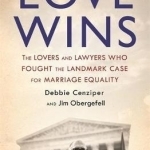
Love Wins: The Lovers and Lawyers Who Fought the Landmark Case for Marriage Equality
Jim Obergefell and Debbie Cenziper
Book
Twenty-one years ago when Jim Obergefell walked into a bar in Cincinnatti and sat down next to John...
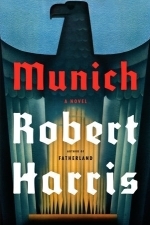
Munich: A Novel
Book
September 1938. Hitler is determined to start a war. Chamberlain is desperate to preserve the...
Thriller politics
